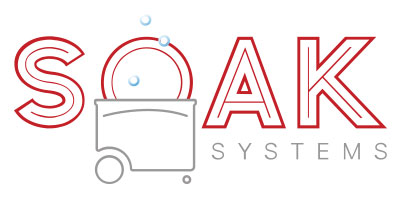How does your system differ from the heated soak tanks?
The cleaning in all soak tanks is provided by a chemical reaction between the solution and the soils on the items to be cleaned. The speed of chemical reactions is determined by 3 factors;
- Contact Time – the items are immersed in the solution so the contact time is the same.
- Chemical Concentration – In order to be people safe – the concentrations of the chemicals in the tanks are all similar to each other.
- Reaction Temperature – Elevating the temperature is the easiest way to speed up the chemical reaction in a soak tank. A speedier reaction means that the dirty items will be cleaned in a shorter time.
Heated soak tanks are good for high volume food service applications where the extra production of the tank offsets the increased costs of the tank and the energy consumed. Our tank is designed for the average restaurant where a room temperature reaction time is still enough to handle their cleaning requirements. Everything gets as clean in an unheated tank – it just takes longer to get it done.
How often does the water need to be changed?
The solution in the tank including the Deep Soak Cleaner Concentrate needs to be changed every 30 days following the instructions on the lid of the tank.
Is the Deep Soak Cleaner Concentrate safe?
The Deep Soak Cleaner concentrate is non-corrosive, non-toxic, and bio-degradable. It will not pit or harm aluminum and stainless steel, and is safe for contact by your employees.
What can I clean in the tank?
The tank is designed to clean hood filters, pots, pans, roasting tins, cook tops, bakery sheets, bread pans, pizza pans, and most of the items used in the kitchen.
Can I clean my Hood filters in the tank?
Soaking grease covered hood filters in the Deep Soak Cleaning Tank is a great way to clean them – and it eliminates the expensive outside service that some restaurants use to clean them.
Is the Deep Soak Solution Aluminum safe?
The Deep Soak Cleaner is aluminum and stainless steel safe provided the solution is changed every month. Part of the formula is used to protect the aluminum during cleaning and loses it effectiveness after one month.
How long must items remain in the tank to be clean?
Typically, an overnight soak will clean the grease and lightly carbonized deposits off of cookware.
What if something does not get completely clean overnight?
If grease is heavily baked on and carbonized, the item may require a longer soak period. We have customers who leave their extremely dirty cookware in the tank over a weekend and when they return the items can be rinsed clean.
Is the used solution safe to be disposed in the drain?
Deep Soak Cleaner is biodegradeable and is contains no chemicals harmful to the environment. At the end of the month, drain the tank into a floor drain as outlined in the instructions.
